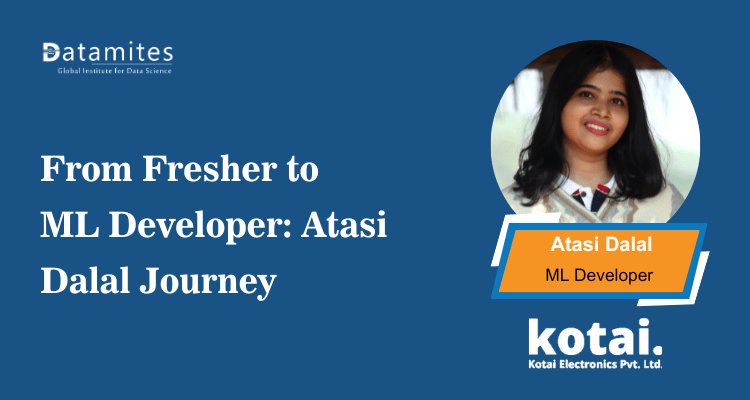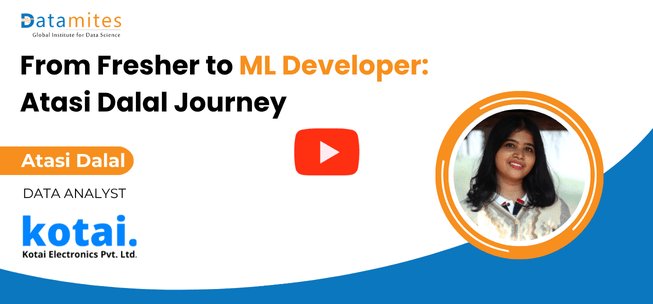Atasi Dalal’s Journey: From Fresher to Machine Learning Developer
Atasi Dalal’s journey from a statistics graduate to a successful machine learning developer is a powerful example of determination and focused learning.

In a world where experience often overshadows potential, breaking into tech as a fresher can feel like an uphill battle. But for Atasi Dalal, a recent postgraduate in Statistics with no prior industry experience, that challenge became an opportunity. With determination, the right guidance, and a passion for data, she transformed from a nervous newcomer into a confident Machine Learning Developer all within a few months. Her story is not just inspiring, it's proof that freshers can make it big in the ever-evolving field of artificial intelligence and machine learning. If you’re wondering whether it’s possible to pivot into data science without a tech background, Atasi’s journey might just be the push you need.
Q&A with Atasi Dalal: Insights and Motivation for Aspiring Data Professionals
Curious about what it takes to break into the world of data science as a fresher? In this candid Q&A, Atasi Dalal shares her journey, challenges, and valuable advice to inspire aspiring data professionals.
Q1: Can you tell us about your academic background and how your interest in data science began?
I'm Atasi Dalal from Kolkata, West Bengal. I completed my Master’s in Statistics from the University of Odisha. During my academic projects, I developed a growing interest in data science. That passion led me to Bangalore, where I joined a data science course and internship program at DataMites.
Q2: What made you choose DataMites for your data science journey?
When I first arrived in Bangalore, I wasn’t sure where to start. I did extensive research and found DataMites to be the ideal platform. The mentors were very welcoming, and the course structure made the learning journey smooth. I began with Python and found the topics incredibly interesting and engaging.
Q3: Did you have any prior programming experience before joining the course?
During my master’s, I had experience with R programming, but Python was new to me. However, I found Python very easy to learn. Its syntax is similar to English. This made the transition smooth even for someone like me without a development background.
Q4: How long did it take for you to become comfortable with Python?
I’m a quick learner, so within one month I became comfortable with Python. I made detailed notes and regularly reviewed them. Most of my batchmates needed around 2 to 3 months to reach the same comfort level, which is quite reasonable for mastering a programming language like Python.
Q5: Was your statistics background helpful in learning data science? What about learners without that background?
Yes, my background helped, especially during the statistics-related parts of the course. But honestly, the statistical concepts used in data science are very basic. Anyone can learn them with a little effort. Concepts like regression, correlation, variance, and descriptive statistics are foundational. Even learners with no prior exposure can catch up within 2 to 3 weeks.
Q6: Atashi, how did you stay committed to learning, especially when the topics were new?
Everything was new to me, Python, machine learning, deep learning but I made sure to keep learning every single day. I took notes diligently, asked questions during and after classes, and my tutors were extremely helpful. They constantly motivated me, saying I could improve and that I was capable.
Q7: How did you structure your daily routine during the course?
After the 2–2.5 hour classroom sessions in Bangalore, I didn't head home. Instead, I stayed back and studied for another 4–5 hours with my peers. We practiced together, discussed problems, and consulted tutors whenever needed. It was like a full-time job. I was at the institute from 10 AM to around 5 PM daily. The environment at DataMites really encouraged us to stay and focus on our goals.
Q8: That sounds intense! Did you find this setup helped you more than self-study?
Absolutely. The classroom atmosphere, the study structure, and the encouragement from tutors and peers kept me going. It’s hard to focus in PGs or at home, but the learning environment at the institute made all the difference. Practicing in a collaborative space boosted both my confidence and consistency.
Q9: Tell us more about your project work. What kind of capstone and live projects did you complete?
We completed 4 capstone projects:
- Home Loan Default Risk Prediction
- Automobile Price Prediction
- Sleep Disorder Detection Using CNN
- Flight Fare Prediction
These took around a month to complete. After that, we worked on a live client project with an ABC Tech company focused on ITSM ticket prediction predicting the number of tickets and their priority levels. That also took about a month.
Q10: How did mock interviews help in your placement journey?
Initially, I didn’t clear my first mock interview. I was too nervous. But that experience taught me how to handle real interviews. I learned how to manage my nerves, answer clearly, and prepare better. The second mock interview went well, and that’s when I started receiving real job interview calls.
Q11: How long after finishing your projects did you get your first job offer?
It took me around 8 to 9 months after joining the course. Initially, I was scared and doubted myself a lot. But once I completed the mock interviews and the DataMites team started sharing job openings via email, I began receiving 4–5 interview calls per week. Before that, I used to apply to 100+ jobs and get only one or two callbacks.
Q12: That fear of not getting a job, how did you handle it?
I think everyone experiences that fear. I used to wonder, “Will I ever get hired?” But DataMites helped me stay positive with constant support. Seeing job notifications in my inbox made me realize that opportunities were real, not imaginary. That really boosted my morale.
Q13: What role did DataMites placement assistance (PAT team) play in your success?
They were very helpful. After my mock interview, the PAT team regularly followed up with resume suggestions and job openings via email. When an interview was scheduled, they’d call to inform and guide me. I really appreciate their support. It played a big role in my placement.
Q14: You’ve started working now. What excites you the most about your ML job?
The fact that I’m applying what I’ve learned to real-world problems excites me the most. I’m just a few days into the job, but every day is a new learning opportunity. I love being part of the ML ecosystem now.
Q15: Where are you working now, and what's your job location?
I got placed at Kota Electronics in Kolkata, which is an AI and computer vision company. I was lucky to find a role in my own city, which makes things easier in terms of settling in and commuting.
Q16: Can you share your overall experience with the course and some tips for current and future learners?
The entire course spanned around 4 to 5 months, including projects and internships. I attended offline classes, which helped me stay focused. Here are my tips for learners:
- Attend sessions regularly: Whether online or offline, consistency is key.
- Make your own notes: This helps in revision and deeper understanding.
- Practice continuously: Implement what you learn to solidify concepts.
- Pay attention to mentors: Most of the clarity comes from listening closely.
Refer these below articles:
- Sarvesh’s Transformation from Software Tester to AI/ML Engineer
- From Math Graduate to Machine Learning Developer: Ankita’s Inspiring Journey into AI
- Reeta’s Inspiring Journey to Becoming a Data Annotator
Key Findings from Atasi Dalal Journey
Atasi Dalal’s inspiring path from a statistics graduate to a machine learning professional highlights the importance of consistency, hands-on learning, and the right mentorship. Her story offers valuable takeaways for anyone aspiring to enter the field of data science.
- Strong Academic Foundation: Atasi holds a Master’s degree in Statistics, which helped her grasp core data science concepts more easily.
- Initial Exposure to Data Science: Her interest in data science sparked during academic projects, leading her to pursue formal training in Bangalore.
- Chose DataMites After Research: Atasi selected DataMites after thorough research due to its structured curriculum, approachable mentors, and supportive environment.
- Transition from R to Python: She had prior experience with R but learned Python quickly, citing its simple, English-like syntax.
- Quick Learning Curve: Became comfortable with Python in just one month through consistent practice and note-taking.
Read these below articles:
- Is There Still a High Demand for Artificial Intelligence in Kota?
- Is There a Growing Demand for Artificial Intelligence in Warangal?
- Agentic AI vs Generative AI: What’s the Difference?
Atashi’s journey is a testament to how determination, structured learning, and a positive mindset can lead to a successful career in data science. From mastering Python in a month to diving deep into machine learning and landing a job in computer vision, her story shows that even freshers can transition smoothly with the right guidance and effort.
DataMites delivers a well-structured and career-focused Artificial Intelligence training program designed for both aspiring professionals and experienced learners. Whether you're based in Kudlu Gate, BTM Layout, Marathahalli, or nearby localities, the DataMites Artificial Intelligence Institute in Bangalore offers accessible and flexible learning options to help you launch or elevate your AI career. With experienced mentors, customizable schedules, and strong placement assistance, getting started in AI is both achievable and convenient.
Artificial Intelligence is shaping the future of work and Chennai is at the forefront of this transformation. Whether you're a student, tech enthusiast, or professional looking to upgrade your skills, now is the perfect time to explore the world of AI. Choosing the right artificial intelligence institute in chennai can open doors to exciting career opportunities and equip you with the expertise needed to thrive in today’s data-driven economy.

